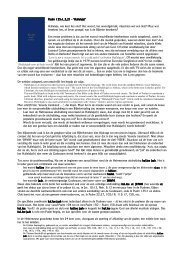psalm 106 vers 20 - Tot Lof van God - het Boek der Psalmen
psalm 106 vers 20 - Tot Lof van God - het Boek der Psalmen
psalm 106 vers 20 - Tot Lof van God - het Boek der Psalmen
Create successful ePaper yourself
Turn your PDF publications into a flip-book with our unique Google optimized e-Paper software.
Over C.D. Ginsburg <strong>het</strong> volgende (eerst <strong>het</strong> Wikipedia-lemma):<br />
Christian David Ginsburg (born 25 December 1831, Warsaw, Poland, Russian Empire [now in Poland] died 7 March 1914, Palmers Green, Middlesex,<br />
England) was a Polish-born, British Bible scholar and student of the masoretic tradition in Judaism. He was born to a Jewish family in Warsaw on 25<br />
December 1831, converting to Christianity at the age of 15. Coming to England shortly after the completion of his education in the Rabbinic College at<br />
Warsaw, Ginsburg continued his study of the Hebrew Scriptures, with special attention to the Megillot. The first result of these studies was a translation of the<br />
Song of Songs, with a historical and critical commentary, published in 1857. A similar translation of Ecclesiastes, followed by treatises on the Karaites, the<br />
Essenes, and the Kabbala, kept the author prominently before biblical students while he was preparing the first sections of his magnum opus, the critical study<br />
of the Masorah. Beginning in 1867 with the publication of Jacob ben Hayyim's Introduction to the Rabbinic Bible, Hebrew and English, with notices, and the<br />
Masoret haMasoret of Elias Levita, in Hebrew, with translation and commentary, Ginsburg took rank as an eminent Hebrew scholar. In 1870 he was appointed<br />
one of the first members of the committee for the revision of the English <strong>vers</strong>ion of the Old Testament un<strong>der</strong> contract with the Trinitarian Bible Society. His<br />
life-work culminated in the publication of the Masorah, in three volumes (1880-1886), followed by the Massoretico-critical edition of the Hebrew Bible<br />
(1894), and the elaborate introduction to it (1897).<br />
An<strong>der</strong>e bronnen (o.a. National Portrait Gallery, Janus-catalog archives) noemen overigens 1821 als zijn geboortejaar,<br />
waardoor zijn overgang naar <strong>het</strong> christendom op 25-jarige leeftijd valt.<br />
Christian David Ginsburg (1821-1914), Biblical scholar and missionary, born in Warsaw, Poland. He pursued Bible studies, and through contact with the<br />
Warsaw mission of the London Society for Promoting Christianity amongst the Jews, was baptised in 1846 and travelled to London un<strong>der</strong> the Society's<br />
auspices. In 1850 he entered the British Society missionary school, Jews' College, in London, and studied Biblical Hebrew and Greek. In 1853 he was<br />
appointed a missionary for the British Society; in 1858 he was naturalised as a British citizen, and in 1867 he married his third wife, Emilie. He retired from<br />
missionary work due to ill health in 1863, and lectured and wrote on various Old Testament subjects. In 1870 he become a founding member of the Old<br />
Testament Revision Company. He edited the text of the Hebrew Bible and the Masorah, and his Masoretico-critical edition of the Hebrew Bible was published<br />
in 1894 by the Trinitarian Bible Society. His great work The Massorah was published in four volumes in 1880-86. In 1904 he was elected editor of the BFBS<br />
New Critical Hebrew Bible, and by 1914 had completed the Pentateuch, Prop<strong>het</strong>s and part of the writings.<br />
Uit Introduction Introduction to to the the Massoretico<br />
Massoretico-critical Massoretico critical critical edition edition of of the the Hebrew Hebrew Bible Bible een beschrijving over ons on<strong>der</strong>werp, The<br />
emendations of the Sopherim:<br />
Op de daaropvolgende bladzijden wordt ver<strong>der</strong> ingegaan op de <strong>vers</strong>chillende bronnen voor zijn beschrijving. Hierboven<br />
worden een aantal ‘emendaties’ genoemd volgens de oudste bronnen, an<strong>der</strong>e bronnen hebben aanvullende gegevens.<br />
5









